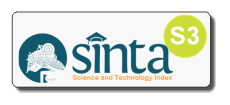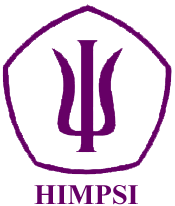Dukungan Sosial, Optimisme, Harapan dan Kesiapan Kerja Siswa
Abstract
Penelitian ini bertujuan untuk mengetahui hubungan antara dukungan sosial, optimisme dan harapan dengan kesiapan kerja. Subjek penelitian ini adalah siswa kelas XII sekolah menengah kejuruan dengan jurusan farmasi di Kabupaten Cirebon dengan jumlah 201 orang. Pengambilan sampel menggunakan teknik cluster random sampling. Alat pengumpulan data yang digunakan adalah skala dukungan sosial, skala optimisme, skala harapan dan skala kesiapan kerja. Analisis data menggunakan analisis regresi diperoleh nilai F sama dengan 65,699 dan p sama dengan 0,000 (p kurang dari 0,05), hal ini menunjukan bahwa dukungan sosial, optimisme dan harapan secara simultan ada hubungan dengan kesiapan kerja (hipotesis diterima). Sedangkan secara parsial diperoleh nilai p sama dengan 0,034 (p kurang dari 0,05) untuk dukungan sosial dengan kesiapan kerja, p sama dengan 0,040 (p kurang dari 0,05) untuk optimisme dengan kesiapan kerja dan p sama dengan 0,537 (p lebih dari 0,05) untuk harapan dengan kesiapan kerja. Dengan demikian terdapat hubungan secara masing-masing antara dukungan sosial dan optimisme dengan kesiapan kerja, serta tidak terdapat hubungan antara harapan dengan kesiapan kerja.
Full Text:
PDF (Bahasa Indonesia)References
Ataç, L. O., Dirik, D. & Tetik, H. T. (2017). Predicting career adaptability through self-esteem and social support: A research on young adults. International Journal for Educational and Vocational Guidance, 18, 45–61. https://doi.org/10.1007/s10775-017-9346-1
Badan Pusat Statistik. (2017, November 14). Jumlah Sekolah, Guru, dan Murid Sekolah Menengah Kejuruan (SMK) di Bawah Kementrian Pendidikan dan Kebudayaan Menurut Provinsi tahun ajaran 2011/2012-2015/2016. https://www.bps.go.id/statictable/2015/09/14/1838/jumlah-sekolah-guru-dan-murid-sekolah-menengah-kejuruan-smk-di-bawah-kementrian-pendidikan-dan-kebudayaan-menurut-provinsi-tahun-ajaran-2011-2012-2015-2016.html
Buyukgoze-Kavas, A. (2016). Predicting career adaptability from positive psychological traits. The Career Development Quarterly, 64(2), 114–125. https://doi.org/10.1002/cdq.12045
Chandra, A. A. (2017, Mei 22). Banyak Lulusan SMK Jadi Pengangguran, Ini Penyebabnya. Detik Finance. Retrieved from. https://finance.detik.com/berita-ekonomi-bisnis/3508298/banyak-lulusan-smk-jadi-pengangguran-ini-penyebabnya
Feist, J. & Feist, G. J. (2010). Teori Kepribadian (Handriatno, Trans.). Jakarta: Salemba Humanika.
Harry, N. & Coetzee, M. (2013). Sense of Coherence, Career Adaptability and Burnout of Early-Career Black Staff in the Call Centre Environment. SA Journal of Industrial Psychology, 39(2). DOI: 10.4102/sajip.v39i2.1138
Hirschi, A., Abessolo, M. & Froidevaux, A. (2015). Hope as a resource for career exploration: Examining incremental and cross-lagged effects. Journal of Vocational Behavior, 86, 38-47. https://doi.org/10.1016/j.jvb.2014.10.006
Karacan-Ozdemirn, N. & Guneri, O. Y. (2017). The Factors Contribute to Career Adaptability of High-School Students. Eurasian Journal of Educational Research, 67, 183-198. DOI: 10.14689/ejer.2017.67.11
Koen, J., Klehe, U. & van Vianen, A. E. M. (2012). Training Career Adaptability to Facilitate a Successful School-to-Work Transition. Journal of Vocational Behavior, 81(3), 395-408. https://doi.org/10.1016/j.jvb.2012.10.003
Kusuma, H. (2017, Mei 5). Penganngguran di RI Didominasi Lulusan SMK. Detik Finance. Retrieved from https://finance.detik.com/berita-ekonomi-bisnis/3493153/pengangguran-di-ri-didominasi-lulusan-smk
Lawshe, C. H. (1975) A Quantitative Approach to Content Validity. Personnel Psychology, 28(4), 563-575. http://dx.doi.org/10.1111/j.1744-6570.1975.tb01393
Negru-Subtirica, O., Pop, E. I. & Crocetti, E. (2015). Developmental trajectories and reciprocal associations between career adaptability and vocational identity: A three-wave longitudinal study with adolescents. Journal of Vocational Behavior, 88, 131-142. https://doi.org/10.1016/j.jvb.2015.03.004
Ogden, Jane. (2007). Health Psychology (4th ed.). Open University Press.
Santilli, S., Marcionetti, J., Rochat, S., Rossier, J. & Nota, L. (2017). Career Adaptability, Hope, Optimism, and Life Satisfaction in Italian and Swiss Adolescents. Journal of Career Development, 44(1), 62–76. https://doi.org/10.1177/0894845316633793
Sarafino E. P. & Smith, T. W. (2011). Healthy Psycology: Biopsychosocial Interactions (7th ed.). Hoboken, NJ: John Wiley and Son, Inc.
Savickas, M. L. & Porfeli, E. J. (2012). Career Adapt-Abilities Scale: Construction, reliability, and measurement equivalence across 13 countries. Journal of Vocational Behavior, 80(3), 661-673. https://doi.org/10.1016/j.jvb.2012.01.011
Savickas, Mark L. (2005). The theory and practice of career construction. In S. D. Brown & R. W. Lent (Eds.), Career development and counseling: Putting theory and research to work (pp. 42–70). Hoboken, NJ: John Wiley & Sons, Inc.
Seligmen, M. E. P. (2006). Learned Optimism: How to Change Your Mind and Your Life. New York: Vintage Books.
Snyder, C. R. & Lopez, S. J. (Eds.). (2002). Handbook of Positive Psychology. New York: Oxford University Press.
Tian, Y. & Fan, X. (2014). Adversity quotients, environmental variables and career adaptability in student nurses. Journal of Vocational Behavior, 85(3), 251-257. DOI: 10.1016/j.jvb.2014.07.006
Tien, H. S., Wang, Y. C., Chu, H. C. & Huang, T. L. (2012). Career Adapt-Abilities Scale — Taiwan Form: Psychometric properties and construct validity. Journal Vocational Behavior, 80(3), 744-747. https://doi.org/10.1016/j.jvb.2012.01.010
Wang, Z. & Fu, Y. (2015). Social Support, Social Comparison, and Career Adaptability: A Moderated Mediation Model. Social Behavior and Personality: An International Journal, 43(4), 649-659. https://doi.org/10.2224/sbp.2015.43.4.649
DOI: http://dx.doi.org/10.17977/um023v10i22021p93-100
Refbacks
- There are currently no refbacks.
Copyright (c) 2021 Jurnal Sains Psikologi

This work is licensed under a Creative Commons Attribution 4.0 International License.
Reference Manager :
|
Aliansi:
Plagiarism Checker :
This work is licensed under a Creative Commons Attribution 4.0 International License.



1.png)








